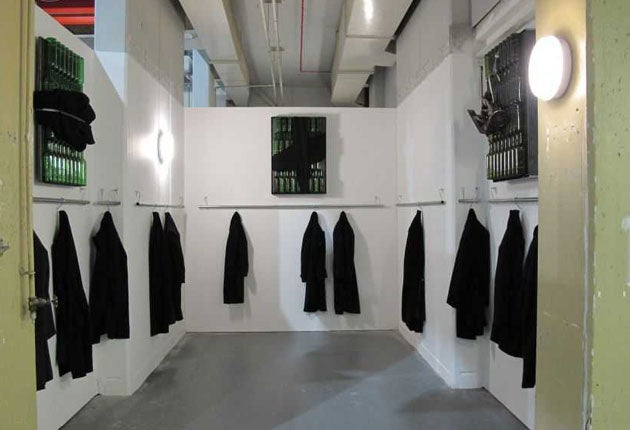Jannis Kounellis, Ambika P3, London
It's no fun staring into the abyss

Your support helps us to tell the story
From reproductive rights to climate change to Big Tech, The Independent is on the ground when the story is developing. Whether it's investigating the financials of Elon Musk's pro-Trump PAC or producing our latest documentary, 'The A Word', which shines a light on the American women fighting for reproductive rights, we know how important it is to parse out the facts from the messaging.
At such a critical moment in US history, we need reporters on the ground. Your donation allows us to keep sending journalists to speak to both sides of the story.
The Independent is trusted by Americans across the entire political spectrum. And unlike many other quality news outlets, we choose not to lock Americans out of our reporting and analysis with paywalls. We believe quality journalism should be available to everyone, paid for by those who can afford it.
Your support makes all the difference.About a decade ago a monstrously ugly, redundant power station on the South side of the Thames was gutted and transformed into a palace of art called Tate Modern and artists fell head over heels in love with the macho appeal of grim industrial spaces. That pattern continues, remorselessly. We no longer live in a world where chic artists necessarily love cleanliness and white walls. Bleakness, the whiff of damp, the harsh glare of neon are all so sexy. They are what we all consist of beneath the glossy veneer of our bourgeois lives.
I am thinking these random thoughts to myself as I stare down from a gantry into the vast, soulless basement that once housed the construction workshop of the engineering department of the University of Westminster. This space is as grimly pitiless and anti-aesthetic as you can get – the nasty slither of piping; grey concrete floors; walls weeping with yellow damp stains. Jannis Kounellis has been creating installations in non-gallery spaces such as this one since 1969. This is his 22nd, and it will shortly be included in a book entitled Jannis Kounellis, XXII Stations on an Odyssey. Thus are myth and religion, and all the gravitas they bring, co-opted into the story.
Kounellis has made a huge K shape up the centre of the basement out of long metal tables. On top of those tables he has stacked a line of thin, tall steel containers, piled high with coal. They shunt along behind each other like railway wagons bearing... coal? Strapped to the sides of some – not all – of these containers are rows of wine bottles, brown, red, clear. Some are the right way up; others are upside down. They make interlocking patterns. The publicity information reminds us to look out for some likeness between these and stained-glass windows. I try. Over this pattern of wine bottles, lengths of fabric, or garments – grubby black coats, for example – have been stretched. There are other collections of wine bottles, locked into similar grid patterns, to be found elsewhere in this basement, and many other coats too.
Let's think what all this could be about. What's in the K-Kabbalistic mystery of a K, for example? Well, K could mean Kounellis, of course. Why not be cutely and vaingloriously self-referential? On the other hand, K could also mean both Franz Kafka and Franz Kafka's anti-hero, K, who never manages to break out of the labyrinth, try as he might. And then there are the coats, old coats, which mean at least some of the following, of course: destitution; death; beggary. Oh, these simulacra of bodies without form or purpose! In short: more fructifying misery.
To 30 May (020 7911 5876)
Join our commenting forum
Join thought-provoking conversations, follow other Independent readers and see their replies
Comments